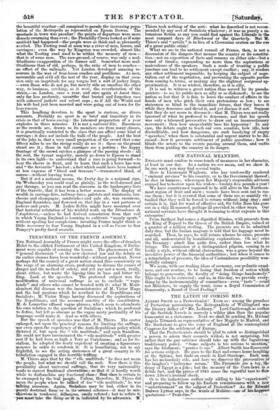TREACHERY OF 1 .111E FRENCH ASSEMBLY. Tea National Assembly of France
might serve the office of drunken Helot to the edified Parliament of this United Kingdom, if Pasha- *tent were capable of conning 'the lesson. The phrenomena of the 44 general discussion " on the new electoral law and the debate on its earlier clauses have been wonderful—without precedent. Never perhaps did the council of a greet nation stand thus consciously on the verge of an alarming crisis, professing to discuss the causes of danger and the method of safety, and yet say not a word, really, about either, but waste the lapsing time in base and bitter tri- fling. Look at the speeches. The professed subject was the modification of -universal suffrage so as to exclude " vaga- bonds' and others who cannot be trusted with it: what M. Mont- alembert did discuss was the inconsistencies of M. Victor Hugo and the bad passions which he ascribed to the Republicans and Socialists; M. Victor Hugo having discussed the aspirations of the Republicans, and. the assumed sanctity, of the constitution. M. de Lamartine effused vague phrases, which seem to adumbrate his own relation to the question of Socialism; which he professed to define, • but left as obscure as the vague misty poeticality of his language could make it. And so with others.
But the speech of .speeches was that of M. Thiers. The orator enlarged, not upon the practical reasons for limiting the suffrage, nor even upon the expediency of the Anti-Republican policy which dictated it, but upon the " vile multitude," and upon Socialism.
i
He could not have incriminated the " vile multitude " with greater zest if he had been as high a Tory as Coriolanus; and as for So- cialism, he adopted the ready expedient of creating a figmentary monster hi order to condemn it -It is humiliating, not to say frightful, to see the acting statesmen- of a great country in its tribulation engaged in this horrible trilling. M. Thiers says that by the " vile multitude " he does not mean 'the people, but what we should call the mob. Now there is this peculiarity about universal suffrage, that its very universality • tends to correct fractional aberrations ; so that it is hardly worth while to disfranchise any fractional class : that class is certain to be swamped by the fee/ people. Unless, therefore, M. Thiers did mean the people when he talked of the " vile multitude," he was telling nonsense. Again, Socialism may be bad, either in its purely doctrinal form-en in its several schemes—it may be mis- ehievous in tendency; fallacious, easily refuted ; but to refute it, —yen mast take the acing- as it ia indhilited by its advocates. Thiers took nothing of the sort: what he described is not recom- mended by any sect of Socialists whatever ; it was as purely i a ca- lumnious fiction as any you could find against the Liberals n the most rampant days of Blackwood or the Quarterly. But IL Thiers's oral " article " is in lieu of a Ciceronian oration on the wee of a greatpublic crisis!
t we see in the national council of France, then, is not a discussion of the dangers that menace the country or its ecrnstitii- tion—not an exposition of facts and reasons on either side—but a round of tirades, expounding no more than the aspirations or malevolence of the speakers. Such a mode of treating a public juncture can lead to no settlement except conflict ; nay, it renders any other settlement impossible, by keeping the subject of nego- tiation out of the negotiation, ;ad preventing the opposite parties
from coming to terms, or making any the slightest reciprocal ap- proximation. It is as wicked, therefore, as it is silly. It is sad to witness a great nation thus served by its pseudo- patriots—to see its public men so silly or so dishonest; to see the nation so lost that it is fain to leave the conduct of affairs in the hands of men who pitch their own pretensions so low ; to see statesmen so blind to the immediate future, that they brave it while they denounce and dread it, and yet discuss it not. Suppose that they do not mean to discuss it—that N. Thiers was not really ignorant of what he professed to denounce, and that his speech was only a laboured provocative to draw out an insurrectionary movement: then how unspeakably base his hypocrisy! In any case, the debate ought to teach our own senators, how idle, how discreditable, and how dangerous, are each bandying of em ety " speeches," when there is substantial and urgent matter to be cussed—how it prevents settlement of public questions ; how it blinds the actors to the events passing around them, and unfits them from guiding the country in its danger.


























 Previous page
Previous page